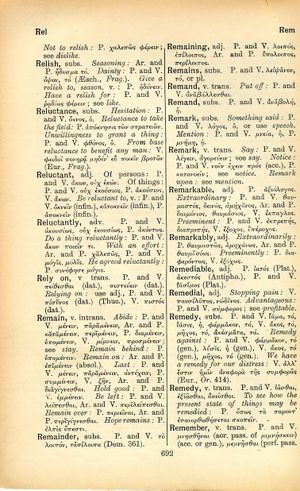reluctance: Difference between revisions
From LSJ
εἰργόμενον θανάτου καὶ τοῦ ἀνάπηρον ποιῆσαι → excluding death and maiming, short of death or maiming
m (Text replacement - "<b class="b2">Frag.</b>" to "''Frag.''") |
m (Woodhouse1 replacement) |
||
| Line 1: | Line 1: | ||
{{Woodhouse1 | {{Woodhouse1 | ||
|Text=[[File:woodhouse_692.jpg|thumb|link={{filepath:woodhouse_692.jpg}}]] | |Text=[[File:woodhouse_692.jpg|thumb|link={{filepath:woodhouse_692.jpg}}]] | ||
===substantive=== | |||
[[hesitation]]: [[prose|P.]] and [[verse|V.]] [[ὄκνος]], ὁ. | |||
[[reluctance to take the field]]: [[prose|P.]] [[ἀπόκνησις τῶν στρατειῶν]]. | |||
[[unwillingness to grant a thing]]: [[prose|P.]] and [[verse|V.]] [[φθόνος]], ὁ. | |||
[[from base reluctance to benefit any men]]: [[verse|V.]] [[φειδοῖ πονηρᾷ μηδέν' εὖ ποιεῖν βροτῶν]] ([[Euripides|Eur.]], ''Fragment''). | |||
}} | }} | ||
Revision as of 08:54, 20 May 2020
English > Greek (Woodhouse)
substantive
hesitation: P. and V. ὄκνος, ὁ.
reluctance to take the field: P. ἀπόκνησις τῶν στρατειῶν.
unwillingness to grant a thing: P. and V. φθόνος, ὁ.
from base reluctance to benefit any men: V. φειδοῖ πονηρᾷ μηδέν' εὖ ποιεῖν βροτῶν (Eur., Fragment).

